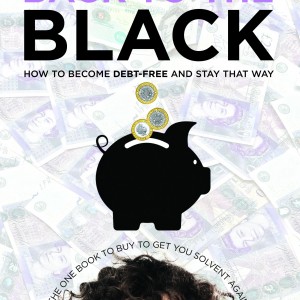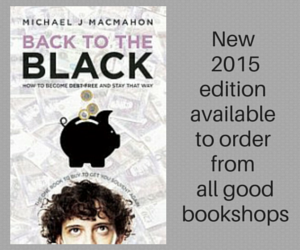
I needed a foreword for my book’s new edition. My first choice was Simon Read of The Independent newspaper; but I didn’t know him. The process reminded me of the truth of the saying “if you want something done, ask a busy person.”


A new book aims to help people facing debt problems, whether triggered by Christmas overspend or any other cause. Author Michael J MacMahon says: “it doesn’t matter what was the cause of your debt problems; the principles for deciding on, and implementing, the best solution are the same.” Continue reading

A new piece by Simon Read of The Independent reveals strategies used by retailers to make us spend more at Christmas. Awareness could help us budget. Karyn Fleeting in Moneywise earlier this year wrote in similar vein re grocery shopping. Continue reading

New edition of ‘Back to the Black … how to become debt-free and stay that way’ published on 21 January 2015. Continue reading

Payday lenders are the current target of regulators. The cap being introduced in January will force nearly all of these firms out of business, claims the FCA. Continue reading
 More than half of all UK homeowners are in for a financial shock when interest rates inevitably rise. This worrying information comes from new research by the Money Advice Service.
More than half of all UK homeowners are in for a financial shock when interest rates inevitably rise. This worrying information comes from new research by the Money Advice Service.
According to Philip Scott of Mindful Money, the survey of more than 3,000 homeowners found that when the cost of borrowing eventually increases (and it’s a case of when, not if) 56% of homeowners have no contingency plan to deal with the higher costs.
Interest rates have been stuck at a historically low 0.5% for over five years and Bank of England Governor Mark Carney has said recently that rates are set to rise in the coming months, “given that the UK economy is back on stronger ground.” (Well, it is in the south-east anyway – Ed.)
According to the study, 47% of UK mortgage holders would find it difficult to meet an increase of, say, up to £150 in monthly repayments.
The Money Advice Service also found that 8% of mortgage holders were actually unaware that rates are likely to rise at all. That figure doubles to 16% for those under 35 years of age.
Financially stretched
The majority of borrowers, at 69%, said they were already financially stretched when they first took out their mortgage. 13% admitted they are currently living beyond their means; and as a result almost one in five said they would really struggle to cover any rise at all in their monthly repayments.
The survey found that 56% said they would find the money to cover any increases by cutting back on day-to-day basics, more than a third at 35% said they would have to use money from their savings, while 15% would need to find an extra job.
Importance of forward planning
Nick Hill of the MAS said: “… even for those on a fixed rate, their deal will come to an end sooner or later. Those who purchased their first property in the last five years will have only ever known historically low interest rates, but less than 10 years ago the interest rate set by the Bank of England was 5% higher than today.
“…it’s a good idea to review your personal finances, start looking at where you can cut back, and plan ahead now.”
Looking at the research, Sue Anderson of trade body the Council of Mortgage Lenders commented: “The monetary authorities have previously flagged that rises will be finely calibrated, so large sudden shocks are unlikely. By planning ahead now, mortgage holders can get a clear picture of what a rate rise would mean for their own repayments.
“Taking steps in advance to work out what the effect on your payments might be, and planning ahead, will mean that most borrowers will be able to cope by careful budgeting. On an average mortgage of around £120,000, a quarter point rise would typically add around £16 to the monthly payment.”
Based on this helpful multiplier, the effect on your own mortgage can be calculated.
Extra £2000 / year?
In a recent issue of Moneywise, Kate Faulkner provides lots of examples of the effect of rate increases; some of them worryingly high. She concluded by saying that if you have a £200,000 mortgage (that’s a fair bit above the national average; but maybe it’s the average for Moneywise readers), but it goes up to 5%, you’ll have an extra £2000 per year to find. That’s not a small sum.
WANT TO KNOW MORE?
For the Money Advice Service website, to find out how a rise in mortgage repayments would impact your finances, click HERE.
For the Mindful Money article, click HERE.
For the Moneywise site, click HERE.
… and I write on the fine art of budgeting in this blog; and in my book ‘Back to the Black … how to become debt-free and stay that way.’
 Coaches and debt counsellors know that questions have power, so their “mental toolkits” are full of questions. The idea is that if the right questions are asked, then the client (that’s you) has, or will find, the knowledge and resources to deal with the situation. As I myself am a coach, I believe this approach is more effective than the client being told what to do.
Coaches and debt counsellors know that questions have power, so their “mental toolkits” are full of questions. The idea is that if the right questions are asked, then the client (that’s you) has, or will find, the knowledge and resources to deal with the situation. As I myself am a coach, I believe this approach is more effective than the client being told what to do.
However, coaches also know that in difficult situations their clients sometimes do need to be advised what to do next; stress makes decision-making hard, if not impossible, and a debt crisis can be a massive cause of stress. Thus the experienced coach or debt counsellor can give advice, or at least suggest some options. But in the long term he or she will prefer that you make the decisions and find the solutions yourself, with prompting by the right questions.
The classic coaching process is described by the acronym GROW. It can be summarised as follows:
Goal
The first step is to define exactly what you want to achieve.
Reality
After defining your goal(s), next comes current reality: a detailed analysis of your financial situation at this moment, listing all your liabilities, i.e. debts; your bank balance; also your current income and expenditure; and finally your assets.
Two things to say about doing the reality check at this point. Firstly, some people have said to me, “shouldn’t I do the reality check first?” The answer is no; it is usually better to set a goal first, then look at where you are now, then decide how to bridge the gap. If you look at reality first, you might be so depressed that you never set a goal.
Secondly, you may be pleasantly surprised, not by the figures themselves, but because writing down the “reality” figures in detail – and all the work of going through bank and credit card statements that you’ll need to do first – reduces the stress of the situation, compared with that vague “sword of Damocles” feeling of threat that has maybe existed for months, during which time you knew you were in a tight spot but didn’t know exactly how tight. You’ve probably heard of Taoist philosopher Lao-Tzu’s famous saying, “A journey of a thousand miles begins with a single step”; it is also sometimes said that the greatest stress in life is caused by inaction owing to unmade decisions. When you have decided your goal(s) and analysed your reality, you have made the first decision and have started on the path to action.
Options
Defining your goals and reality will show you the size of the gap to be bridged. This is the time to brainstorm (alone or with a friend or adviser) to find the options for bridging the gap. Chapter 6 suggests a way of conducting this exercise. The purpose of brainstorming is to develop the maximum number of ideas on the chosen topic, with a totally open mind, i.e. a stream of consciousness before your inner critic kicks in and starts saying “that won’t work.” Then, and only then, do you begin to evaluate the various options and start to formulate your plan.
Way forward (what, when, etc.)
“The best-laid schemes o’ mice an’ men gang aft agley,” as the Scottish poet Burns tells us. “Gang aft agley”, of course, means they often go wrong. Setting a goal, analysing current reality and then developing some options to bridge the gap are necessary but not sufficient. Obviously, without action those goals will remain just pipe-dreams. So the next step is to make a practical plan, which is no more nor less than a list of actions, prioritised and with deadlines.
Questions are powerful; and perhaps the most powerful of all are the “W-questions”. What will you do? When? Who can help you? Etc, etc.
But for the time being, forget the “why” question; that’s more to do with the reasons you got into debt. That’s the past; you are dealing with the present and the future.
So you need to ask yourself all those questions and then act on the answers.
*****
This article is an extract from my book “Back to the Black.” A new edition will be published shortly.
WANT TO KNOW MORE?
For more info on the book see LINK
For more info on the GROW model, see “Coaching for Performance” by John Whitmore.
 I recently quoted from a post on StepChange’s “Moneyaware” blog: that’s a blog I like a lot.
I recently quoted from a post on StepChange’s “Moneyaware” blog: that’s a blog I like a lot.
Their online strapline says “The StepChange MoneyAware team help you avoid debt with practical advice and tips on saving money, budgeting, debt news and ways to stay on top of bills.” From what I’ve seen, the blog pretty much “does what it says on the tin.” And it does it very frequently, which is more than you can say about yours truly.
Moreover it has a sense of humour. One post, about the World Cup, begins: “In the MoneyAware team we have a healthy mix of football-mad enthusiasts and those who are vaguely aware there’s some reason EastEnders isn’t on at the usual time.”
An older post (August last year, I think) asks if you can ever believe it when someone says they can get all your debts written off.
“Your debts written off” – can you believe such a claim?
In my book I wrote extensively (Chapter 9, “Out of Your Hands” and Chapter 10: “Negotiate a Deal”) about ways of getting a proportion of your debts written off; and lots of advisers can help you do just that. But 100%?
The conclusion, in general, was no. In other words: “when something seems too good to be true, it generally is.” However, then I read (and this surprised me) that in some circumstances a specific debt can be written off 100%, if it is “statute barred” through a piece of legislation called the Limitations Act.
To quote from the StepChange blog:
“This is the only real piece of debt law that could see your debt deemed unenforceable.Creditors are unable to legally pursue you for the debt if, after six years:
So, I hear you cry, ‘All I have to do to get my debts written off is ignore the creditors and not pay them anything for six years!’
Erm no, not really, that wouldn’t actually work.
As the above explanation suggests, if you start to ignore your creditors they’re liable to get in touch with you rather quickly and may even do this through the courts, by obtaining a CCJ or other debt collection procedure available to them.
‘Okay, I’ll move house and not tell them!’ some might shout.
“That really won’t work either as it’s your responsibility to keep your creditors updated with your current address. Moving house and not telling your creditors where you’ve gone is seen as debt avoidance. This isn’t recommended.
The Limitations Act
“The Act isn’t there to encourage debt avoidance or non-payment and most judges will take a dim view of this tactic. It’s there to protect people from being forced to pay debts that have ‘timed out’ through no fault of their own.
“The money owed itself is not written off; it’s still a debt and in reality it still exists (and presumably remains on your credit record – Ed.) but with the Act in force the creditor can no longer enforce the debt.”
WANT TO KNOW MORE?
For the StepChange post in full, click HERE.
 One of the debt charity StepChange’s advisers moved on earlier this year. His farewell blog post was very informative: a good example of the advice that’s available regularly on their blog. I am sure he – and StepChange – will not object to my quoting it.
One of the debt charity StepChange’s advisers moved on earlier this year. His farewell blog post was very informative: a good example of the advice that’s available regularly on their blog. I am sure he – and StepChange – will not object to my quoting it.
“Six truths about debt I’ve found from working at StepChange Debt Charity” (Matthew Cooper)
Truth 1: Creditors will generally accept your best offer of payment
Provided that they are convinced it really is your best offer, I’ve usually thought this to be true. But Matthew’s evidence in support of the theory is amazing: only one proposal rejected … out of 300!
“My job was to give advice on debt solutions and draft the actual individual voluntary arrangement (IVA) documents for clients. I drafted around 300 IVA proposals in about two years. All but one of them were accepted by creditors. I learned that if you make your best offer to creditors they’ll generally be willing to accept.”
Truth 2: Debt can happen to anyone
That’s something I found when researching stories for my book ‘Back to the Black.’ Matthew confirms this:
“While working as an IVA drafter I heard many stories of how people ended up in debt. In most cases debt problems are caused by life-changing events such as unemployment, relationship breakdown, accident or illness.”
Truth 3: Bust out the budget
Here’s the painful part, when you move out of the “denial” phase and start to analyse your financial position. Some humourist once said “A budget is a mathematical confirmation of your suspicions” … but it’s surprisingly true that knowing the worst is less stressful, compared with suspecting the worst but not being sure. Then, when you have an accurate picture of your current situation, you can start to draft a budget (maybe a few versions for different scenarios: see my book) that’ll help you decide what to do next. Matthew says:
“In my time here I’ve helped a lot of clients to put together a budget; as someone who is keen on budgeting I was sometimes amazed that some had never put an accurate budget together before. Over the years I’ve seen the clients who paid careful attention to their budgets be successful in repaying their debts. I now spend at least an hour a week looking over my budget to make sure I stay on track. An emergency fund is also a vital part of a budget, whether you have debts or not.”
Truth 4: Credit isn’t necessarily bad
“I’ve learned that credit isn’t necessarily a bad thing in itself and, like most things in life, it can even be good in moderation. It’s vital not to over-commit yourself though and you should be prepared as your life can change at any time. Despite their bad press creditors aren’t all bad either, as long as you’re honest about your situation. As a charity we want to help the ‘can’t pays’ rather than the ‘won’t pays’; creditors tend to share this attitude.”
That’s an interesting statement right there at the end: the “can’t pays,” as he puts it, are the group that StepChange exists to help; and they are the group with whom creditors are more likely to negotiate reasonably.
Truth 5: Never pay for debt advice
Matthew says:
“I’ve also learnt that there is genuinely no need to EVER pay for debt advice. Our advisors are brilliantly trained and highly knowledgeable and will always strive to give the best advice for your personal situation. We’re not for profit but we are for giving best advice.”
Truth 6: My colleagues are great at helping people in debt
I’ve never spoken to those colleagues personally; my own crisis was back in the ‘90s. However, judging by the quality of the info on their blog, I would support that statement 100%. So I’m sure Matthew won’t mind if I repeat in full his plug for his colleagues:
“I’ve made some great friends while working for the charity and together we’ve served a great common cause – ‘free debt advice’. My colleagues are knowledgeable, committed, ethical, funny and warm and they treat people who contact us with a great deal of empathy and never judge them. It’s time for me to hand over to another person to take on my role now. I hope they enjoy it and learn as much as I did during my time with this great charity.”
Citizens Advice was the charity that helped me with my debt crisis, largely because they had a Bureau near me where I could have face-to-face meetings. However they are a generalist advice charity, whereas StepChange is a debt specialist.
And judging by their blog, an excellent one.
WANT TO KNOW MORE?
For Stepchange’s “Moneyaware” blog, click HERE. http://moneyaware.co.uk/
For info about my book “Back to the Black”, click HERE. http://getbacktotheblack.com/
 Wonga, the UK’s largest payday loan company, has been ordered to pay £2.6m in compensation, after sending letters from non-existent law firms to customers in arrears.
Wonga, the UK’s largest payday loan company, has been ordered to pay £2.6m in compensation, after sending letters from non-existent law firms to customers in arrears.
The letters threatened legal action, but the law firms were false. In some cases Wonga added fees for the letters to customers’ accounts, according to the BBC.
The customers affected (45,000 of them) will each receive £50 for distress (a piddling amount, surely?) plus any legal fees they have encountered. The regulator in this case is the Financial Conduct Authority (FCA); they cannot however fine Wonga because the offences happened before they started regulating payday loans companies.
Richard Lloyd, executive director of consumer group Which?, said: “It is right the FCA is taking a tougher line on irresponsible lending and it does not get much more irresponsible than this.
“It is a shocking new low for the payday industry that is already dogged by bad practice and Wonga deserves to have the book thrown at it.”
Tougher line? £50 each? I imagine the people at Wonga are laughing.
Wonga is not the only lender to do this. Back in my debt-crisis days, I received a letter from a non-existent firm of solicitors. I was only alerted to the fact when I noticed that the initials of the firm were identical to those of the bank that was chasing me for the debt. It’s sharp practice and could cause considerable distress, because most people have a healthy respect for the law. And that’s how it should be. So to use that fact in this way is pretty despicable. £50 each, eh?
There is an existing Code of Practice from the Office of Fair Trading (OFT) regarding harassment of debtors, although it is often ignored. I’ve blogged about it more than once; for details click HERE.
WANT TO KNOW MORE?
For the BBC News item, click HERE.
For the OFT Code of Practice regarding harassment of debtors, click HERE.